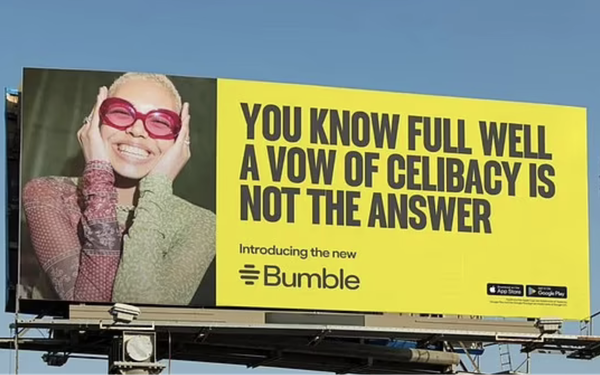Commentary
Now Bumble Stumbles, Pulls Ads, Apologizes
- by Barbara Lippert , Columnist, May 15, 2024

Is advertising entering a new era of apology?
Last week, Apple pulled an ad and issued one of its very rare apologies, for showing examples of the arts and human civilization being crushed to fit into its thinnest new iPad.
Rather than laughing, otherwise loyal Apple folk rose up on the internet to denounce the ad and its insensitivity. They mentioned the irony of the original anti-Big-Brother company coming full circle to achieve its own Big Bro status, steamrolling over the centuries-old human arts.
Now the dating app Bumble has also issued its own act of contrition for a series of ads bluntly chiding women to get back out there and start having sex. This was especially perplexing coming from the only dating app in which it’s up to the woman to make the first move.
advertisement
advertisement
Growth and profits are down for most dating sites post-pandemic. And Bumble announced 350 job cuts this February. In the wake of a recent redesign for the app, these ads were launched to reinvigorate those “exhausted” female daters on their way to dropping out.
“THOU SHALT NOT GIVE UP ON DATING AND BECOME A NUN,” preached one billboard ad, in all caps, showing a cool-looking woman standing on her own.
“YOU KNOW FULL WELL THAT A VOW OF CELIBACY IS NOT THE ANSWER,” announced another.
Are they supposed to be funny? It’s hard to imagine that anyone would find this scolding, shaming tone -- whether meant to be satiric or a parody or not -- encouraging or motivating. Or that mentioning “becoming a nun” -- with the blanket insensitivity that those three words convey-to Christians -- would earn any friends.
Moreover, as Bumble discovered, these days the word “celibacy” comes with its own hotbed of controversy. It’s where young male “incels” are rooted in thinking feminism has destroyed the world, while some younger women need time to get over a toxic hookup culture, in which they sometimes feel forced to have sex.
But more generally, such broad and blunt statements bring us right back to that out-of-it family elder, pressuring their granddaughters to get on the dating apps because, without a man and marriage, you’re nothing -- plus you’re a weirdo if you choose to be single.
People who’ve already been through the mill with online dating (getting ghosted, breadcrumbed, catfished, etc. -- there are a million newish terms for lying, cheating and false identities) don’t necessarily find more of that the answer to life. Some are going “boysober,” a term invented by a young female comedian to convey the healing aspect of a dating break. And if a line like “Thou shall not give up on dating and become a nun” suggests that you should get out there just for the sex, that’s both dangerous and creepy.
Even more astounding, the message flies in the face of Bumble’s own research, done in the fall of 2023. Its report on dating trends said that “Bumble daters are interested in low-pressure dating.”
“One in three U.S. Bumble users say they are ‘slow dating’ and actively going on fewer dates to protect their mental health when it comes to dating,” said a Bumble spokesperson.
The negative reaction to the ads was swift. Women felt like they were getting blamed and shamed, and they just weren’t having it.
The apology, addressed “To our beloved Bumble Community,” was also swift, posted to Instagram.
“We made a mistake” Bumble said, simply. “Our ads referencing celibacy were an attempt to lean into a community frustrated by modern dating, and instead of bringing joy and humor, we unintentionally did the opposite.”
The company pulled the ads and announced it was making a donation to the National Domestic Violence Hotline and other similar organizations, offering them their remaining billboard space to put up their own ads.
Will it be enough? Of course not. Bumble ended up alienating the very people they aimed to invigorate.
Bumble’s tumble, however, is part of an existential question that also involves companies like Apple.
In an era where people are tired of spending and resisting obvious provocation, it’s up to advertisers to get more nuanced about exactly what it is that they are selling.



